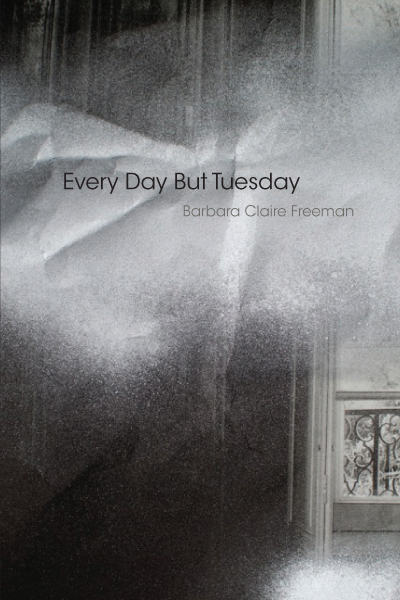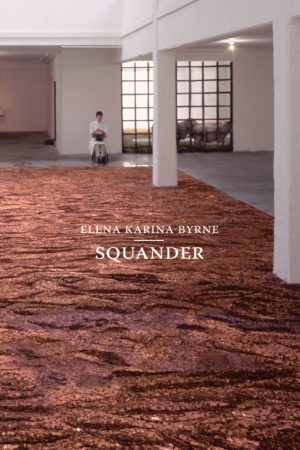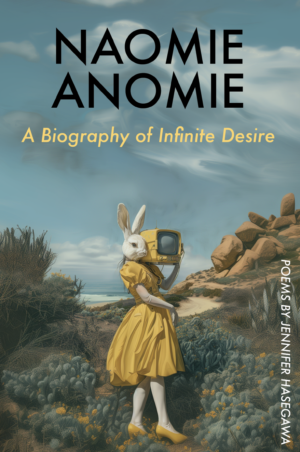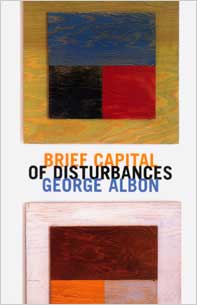Description
Every Day But Tuesday, Barbara Claire Freeman’s remarkable second collection is a book of lyric experiments amassed from a space beyond ordinary time, where “this is tomorrow and the sun” stands, reverberating both as precursor and postscript to the apocalypse. From this alternate field containing the formal varieties of shape and sound alongside the manmade and natural worlds, “day creeps down / where lakes divide one body from another / green hills open, subordinates / watch afternoon become a night-child / shuttling back from private space / to public damage, how else could it happen—” and it’s in this deeply imagined book that everything happens. The extraordinary world of these poems, coming from the sea, forests, islands, mountains and rivers, form an utterly new logic of sound patterning and metric sense-making, colliding a series of gorgeous associations with a suite of prepositions forever reconfiguring.
Every Day But Tuesday offers the intricate suggestiveness of Symboliste poetry in the straightforward musical language of objectivists like Lorine Neidecker. Here the actual object is the material force that allows us to feel the weight of a fluid world finding complex substance through mobilizing all the resources of grammar. It is not much of an exaggeration to say that Freeman treats both sonic effects and grammatical complexities as the basic personages in her poems. The result is a sensual volubility that treats as a cause of satisfaction the realization that objects cannot appease the hungers of mind.
Charles Altieri, Rachel Stageberg Anderson Chair, University of California, author of Wallace Stevens and the Demands of Modernity: Toward a Phenomenology of Value
Opening with a “closed” “way” (or a way closed in hearsay), and proceeding to look, unceasingly, for a “truer way,” Barbara Claire Freeman’s new collection is restless but also at ease in its quest. The spacious and lovely lyrics of Every Day But Tuesday beautifully describe an ongoing, transformative, journey—where every end point is also a beginning, and the before of what might not ever happen dissolves into the after of what “hasn’t yet occurred.” This is a book by one who, as Bishop put it, would rather have the iceberg than the ship, or, one who would likely trade either apparent stability for the waves—for Freeman is one of Ashbery’s best heirs, someone who finds her own way into the in-between spaces opened by affect’s tendency to roam (it’s not just chance that the book keeps returning to the image of a voyage). Here abstract idea becomes concrete image and vice versa, in quicksilver ways that remind us of how transitory the real is and how oddly, gorgeously durable perception can be: “moments flashing, gathered stones.”
Laura Mullen, author of Dark Archive
Barbara Claire Freeman’s new book is unlike anything I’ve come across, trading as it does in beauty and loss, fragility and survival, the here-for-now and the soon-to-be-gone. Like “a song in the form of a question,” the question here is stretched to fit the form of a book, with prosody that’s as cutting as it is conversational, intimate as it is otherworldly. “If the moon wakes them they will be happy / I was at the summit, I was alone.” And lucky for us, we get to climb to that summit, with Freeman’s gorgeous work. Every Day But Tuesday got its hooks into me early, and I took from it slowly, trying not to find its end.
Joshua Marie Wilkinson, author of Meadow Slasher
About the Author
Reviews
Excerpt
Barbara Claire Freeman is a literary critic and professor of literature who has recently turned her full attention to writing poetry. She is the author of The Feminine Sublime: Gender and Excess in Women’s Fiction (University of California Press), among many other works of literary theory and criticism. Formerly an Associate Professor of English at Harvard, she teaches creative writing and poetics in the Rhetoric Department at UC Berkeley.
Incivilities, her first collection of poems, was published by Counterpath Press in 2009; a chapbook, St. Ursula’s Silence, was published by Instance Press in 2010. Selections from these collections won the Boston Review/Discovery Prize and the Campbell Corner Prize (Sarah Lawrence College). A second chapbook, #343, was published by Chapvelope Press in 2014. Every Day But Tuesday, a second collection of poems, is forthcoming from Omnidawn Press in 2015. Work from this collection has appeared or is forthcoming in A Public Space, Agriculture Reader, Boston Review, Colorado Review, Crazyhorse, Denver Quarterly, Forklift, Ohio, Jacket 1, Lana Turner, Laurel Review, The Offending Adam, The Volta, Seattle Review, Volt, Washington Square, and Wave Composition, among others.
A brief interview with Barbara Claire Freeman
(conducted by Rusty Morrison)
1. I first read your poetry when you were a winner of the Boston Review/Discovery Prize. That piqued my interest and so I was glad to see your first collection, Incivilities, published by Counterpath Press, receive such impressive endorsements: Judith Butler and Timothy Donnelly. Impossible to convey substantively their claims for the book, but I’ll just highlight two of the issues raised that especially engaged me: Judith Butler’s astute perception that in your “extraordinary collection.… the syllables somehow stand [as] insistent scraps of language pushed beyond the possibility of narrative sequence by forms of destruction”; and Timothy Donnelly’s insight that “Freeman’s poetry carries with it the hope that we might restore to sense what experience’s avalanche undoes.… yet… [the poems] entertain, half-tragically, the possibility of such restoration only as long as the sentence proposes it.” Though the reader of Every Day But Tuesday will experience similarly searing insight into the injustices of economic, interpersonal, ecological crises, the constellating force of the form of this new work speaks to a reader in ways few if any other books of poetry achieve. I sense the work proposing syntactically, tonally, perhaps even etymologically in its diction choices, that while truth is transient, contextual, shifting, and not to be referenced or uncovered in the interrogations of event, it is, as Derrida suggests, contained in movement, only in movement. And the poems are indeed in constant movement even as they both alert me to, and alter continually, my expectations of arrival. It is the movement from word to word, line to line, sentence to sentence, the formal rigor and what it evokes, which stuns me, and illuminates so much more of the irresolvable in our natures than words themselves can articulate. Still, I want to ask you to talk about it! Can you speak to the crafting of these sentences and the evolution of this groundbreaking text, which mesmerizes as its music brings us to the brink of our lives’ implacable mayhem?
Rusty, thank you for all of the above. Is it possible to respond to your inquiry by saying that you have asked me to “talk about” precisely what I cannot articulate? Perhaps if I could describe how these poems were crafted I would not have felt the obligation to write them and there’d be no book to discuss! For me, writing poetry demands an extraordinarily difficult and all-too frequently impossible attentiveness to sound, rhythm, syntax, the relation of line to sentence and/or phrase etc., an attentiveness that is usually accompanied by an acute sense of failure. The work you praise so generously is the result of months of revision, and I’m never sure a poem will or has come into existence until long after I stop revising it. That said, I am always trying to find forms that embody (or translate?) a certain absence—perhaps it is the “lavish absence” that is the title and subject of Rosmarie Waldrop’s gorgeous book about Edmund Jabès: an absence that is at once generative and painful. Writing about Jabès in Writing and Difference, Derrida remarks that “writing takes root in a wound.” The “wound” he references is at once unique to the individual who shapes and is shaped by it and, perhaps more importantly, a constitutive feature of the language/s we share. The poems in Everyday But Tuesday might be considered a series of formal experiments that articulate and re-articulate wounds that are both personal and collective.
The book has an underlying structure: it is composed of a variety of forms each of which finds its corollary in a specific land-, sea- or cityscape. Your intuition that the poems are always in motion is entirely correct! Each form corresponds to a particular location in which the poem takes place, turns, departs. There are train stations and airports, marshlands, deserts, and forests, an island, a ship filled with wanderers who are always at sea, etc. All of the forms in Section One return and find their counterpart in Section Three; moreover, the second section, titled #343, is a series of 23 poems that triangulate and re-articulate this play of doubles. The sequence takes place in a large, extremely dark forest; I envisioned each stanza as if it were a tree that was the copy of another tree. A few examples of the form/location congruence are the narrow, minimal poems such as “Parable” and “Untitled” which are located in a desert and the short, narrative poems “Evening on the Other Channel,” “Blindness and Hindsight” and “Heraclitus” which are set on a island populated mainly by ghosts. All but one of the series of sonnets that wends its way through the book take place on a ship that is perpetually at sea and has no particular destination. Everywhere in the book simulacra proliferate and abound. (I wanted, but don’t expect, the reader to hear the presence of the number two within the word “Tuesday.”)
2. In his Introduction to the book Charles Altieri remarks upon “the volume’s over-riding concern with temporality—with what passes and with what has to get modified continually to allow a sense of presence.” How would you respond to this?
I should add that Everyday But Tuesday also concerns itself with locating in the present tense (and political context) of experience the slippages and paradoxes of language and inquiry—from Heraclitus to Benjamin, and beyond. There is a collision here between a lyric attention to the particulars of sensation and the abstractions of an intellectual system, a tension between mediacy and immediacy. Nature passes into artifice: “As night progressed bamboo gave way /piece by piece to paper,” and vice versa. That said, I agree with Altieri’s acute insight: the theme of “temporality” is everywhere present at the level of both formal structure/s and subject matter. Throughout, I challenged myself to describe a world (or worlds) in which time had stopped, but no Messiah had appeared.
3. You were an accomplished literary critic before you came to writing poetry. Can you speak to the relationship between that work and this work and/or describe how and why you stopped writing theory and criticism and began writing poetry?
My experience is perhaps unusual as I don’t know of any well-established scholars who stopped writing expository prose and turned exclusively to writing poetry, which is what I’ve done for the last nine-ish years.
I had the pleasure of teaching literary/cultural theory and fiction at Harvard, first as an Assistant and then as an (untenured) Associate Professor. After writing The Feminine Sublime: Gender and Excess in Women’s Fiction and many articles, I realized that this phase of my life as writer had come to an end. The interventions I’d made regarding aesthetics, narrative structure, and gender theory had been made and were well-received. Perhaps that very reception allowed me to take a deep breath and realize that I no longer wished to write in analytic, expository forms. The conventions of writing academic prose has inherent limitations that no longer fit; my work as a critic had pushed on these limits quite strenuously but the arguments I’d needed to address had been made and were now part of a continuing dialogue.
I began writing “poems” (I added quotation marks because they were really just notes) shortly before I left Harvard, and I’m not sure what provoked them. Perhaps in response to (and disagreement with) Wallace Steven’s early poem about St. Ursula (“Cy Est Pourtraicte, Madame Ste Ursule, et Les Unze Mille Vierges,”) I wrote a series about the life of that saint, who traveled at sea accompanied by 100,000 virgins, refused to marry, and eventually suffered martyrdom. Peter Sacks was a colleague and friend and I gave him the collection without thinking much about it. I was clueless about the poetry world and culture of poetry, but I did want his opinion. Peter wrote me a profoundly enthusiastic and encouraging letter. He urged me to continue writing poetry and to take it seriously. I took his advice and the St. Ursula poems eventually became a chapbook that was published by Instance Press in An Instance, one in a collection of three chapbooks. I don’t think I would have “become a poet” without Peter’s support, but in any case it was important for me to move from accounts of literary works to their production—move, towards enacting, not just describing, the powers and perils of literary form.
4. Would you say more about sequence titled #343 and its relationship to many of the central concerns appearing in Every Day But Tuesday?
#343, the middle section of poems, was written while I had the pleasure of attending an extraordinary seminar given by Judith Butler on “Kafka and his Commentators” at UC Berkeley, where I currently teach; it references a Benjaminian poetics of non-arrival in which time has stopped but no messiah has appeared. The poem takes its title from an Emily Dickinson poem known by that number in which the author speaks of her “Reward for Being,” perhaps looking forward to some future in which the “ballots of eternity” will affirm the value of her poetry. Heidegger, Celan, Kafka and other voices central to modernity and its disasters clash and combine in the clearing formed by the decaying stanza pattern pirated from Dickinson and unfolds a hermetic poem into a serial exploration of transmission itself—what voices are recorded or unrecorded, what gestures can survive in “all that noise.” While #343 refuses to treat futurity as a given, I hope that the dark eloquence of the lines affirms the power of poetry to resonate with the “unrecorded” through the technology of writing, a kind of vigil for those whose future never arrived, the poem “a glimmer / passed on in the night to others.”
5. Could you talk about any writers &/or artists &/or thinkers who have influenced you in this work? (in what direct or indirect ways have you felt this occur?) And/or could you talk about who you are reading currently? With whom do you feel a kinship or a provocation or…?
The work of Wallace Stevens and the earlier work of John Ashbery are hugely important to me. Graham Foust once told me that he re-reads Stevens every year, and I’ve adopted that practice. And I love to re-read Ashbery’s “Clypsedra” aloud; what an amazing listening experience that poem is! Barbara Johnson’s gorgeous translation of Mallarme’s Divigations mattered, although I can’t say exactly how or in what way.
Some of the poets whose work I read and re-read throughout the course of writing this book include Michael Palmer (especially Notes from Echo Lake), Ben Lerner, Lisa Robertson, Brenda Hillman, Timothy Donnelly, Cole Swensen, Geoffrey G O’ Brien, and Joshua Marie Wilkinson.
6. Would you tell me a bit about yourself? Anything you are willing to share that might not be in your short bio that is published in the book?
I’m proud to be the publisher of Minus A Press, an extremely small (practically invisible) press. It publishes books that are not for sale; they are available as a gift to anyone who asks for them as long as they last. I had no intention of starting a press but in the Fall of 2009 I heard Graham Foust read “To Anachreon in Heaven” to a standing-room only audience at the Studio One reading series in Oakland. It is a very long poem and, since it wasn’t committed to publication prior to its appearance in a book, I asked him if I could publish a limited edition that we could give away. We agreed to do the project on the condition that Jeff Clark design it inside and out—and Jeff, god/s bless him, created a beautiful small book. It was a joy to publish and give to people who cherished it. Again with Jeff’s design, I published Three Poets in 2013. It features work by John Ashbery, Timothy Donnelly, and Geoffrey G. O’Brien. One more book is forthcoming. It’s called Four Poets, includes new poems by Brett Fletcher-Lauer, Brenda Hillman, Joshua Marie Wilkinson, and Andrew Zawacki, and will be available in the Fall of 2015. Anyone who wants one can receive a copy by writing to me or any of the poets. Sadly, the books don’t stay available long, but the poems become part of the poet’s next full-length collection. I hope that there will be another.
These poems are clean and discriminating, revealing a poet concerned with the tension of the line, the tension of silence, and the pursuit of something beyond epiphany, something closer to truth.
The figures traversing Freeman’s obscure, elemental landscapes are colonists and captives, castaways and survivors, sovereigns and those who use the service entrance. As per its title [Every Day But Tuesday], Freeman’s bracing book troubleshoots the broken circuit of time in our time, compelled by the precarious hope that our “present / soon-to-be outsourced” might nonetheless manufacture a worthy future here at home. Her nervous hum is “a song in the form of a question.
Forward
By March nothing terrible has happened.
Only clouds, wind, stone,
sometimes a distant engine
before the others wake. Mud underfoot
seems a little firmer
this time around, the breeze
a long quotation.
Shifting banks of words rise like steam
in darkness or under water. Miles
from the nearest whatever, at
the very moment description advances
into daylight, yellowing wood
from a recent overhaul disappears
over the ridge. But by then
a fence was falling or a woman
had dismantled it. Just seconds ago
in the new climate, rain so dense
it took my breath. All arrivals
postponed, no one has been
back since. Latest reports
show that months are slowing down
a little more each year. Another
cool day tomorrow with morning
frost along the road. I’m always
the last to know but I hear it’s closed—
the river, the forest, this way.





